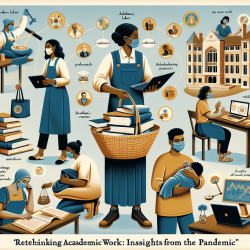Introduction
The COVID-19 pandemic has reshaped many aspects of our lives, including the way we perceive and perform work. The research article "Care in times of the pandemic: Rethinking meanings of work in the university" by Özlem Altan-Olcay and Suzanne Bergeron provides a critical examination of how the pandemic has highlighted the undervaluation of care-related academic labor. This blog post explores the findings and suggestions from the article, offering insights for practitioners in educational settings to enhance their understanding and practices.
Understanding the Research
The study argues that the pandemic has exposed the inequitable gender divisions of labor within academic institutions. It emphasizes the need to revalue care work, such as teaching, mentoring, and service, which are often devalued despite their essential role in sustaining educational institutions. The authors propose using Feminist Political Economy (FPE) methodologies to gather and reconceptualize data on academic work, aiming to reframe and revalue care as a crucial component of academic labor.
Key Insights for Practitioners
For practitioners in educational settings, particularly those involved in online therapy services like TinyEYE, the research offers several actionable insights:
- Recognize the Value of Care Work: Acknowledge the essential role of care-related tasks in academic and therapeutic settings. This includes recognizing the emotional and intellectual labor involved in providing support to students and clients.
- Advocate for Equitable Work Distribution: Encourage institutions to assess and address gender disparities in workload distribution. This can involve promoting policies that ensure equitable sharing of teaching, mentoring, and service responsibilities.
- Utilize Data-Driven Approaches: Implement FPE methodologies to collect and analyze data on work practices. This can help in identifying areas where care work is undervalued and in developing strategies to enhance its recognition and reward.
Encouraging Further Research
The article highlights the importance of ongoing research to further understand and address the challenges associated with care work in academic settings. Practitioners are encouraged to engage in or support research initiatives that explore the dynamics of care labor and its impact on gender equity and institutional sustainability.
Conclusion
Revaluing care work in academic settings is not only essential for achieving gender equity but also for the well-being and sustainability of educational institutions. By implementing the insights from this research, practitioners can contribute to a more equitable and supportive work environment.
To read the original research paper, please follow this link: Care in times of the pandemic: Rethinking meanings of work in the university.










